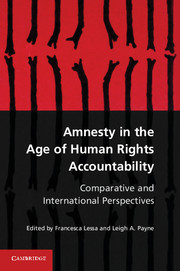Book contents
- Frontmatter
- Contents
- Contributors
- Foreword
- Acknowledgments
- Introduction
- Part I Theoretical Framework
- Part II Comparative Case Studies
- 3 Amnesties’ Challenge to the Global Accountability Norm?
- 4 From Amnesty to Accountability
- 5 Barriers to Justice
- 6 Resistance to Change
- 7 De Facto and De Jure Amnesty Laws
- 8 Creeks of Justice
- 9 Accountability through Conditional Amnesty
- 10 De Facto Amnesty?
- 11 A Limited Amnesty?
- 12 The Spanish Amnesty Law of 1977 in Comparative Perspective
- Conclusion Amnesty in the Age of Accountability
- Bibliography
- Index
- References
5 - Barriers to Justice
The Ley de Caducidad and Impunity in Uruguay
Published online by Cambridge University Press: 05 June 2012
- Frontmatter
- Contents
- Contributors
- Foreword
- Acknowledgments
- Introduction
- Part I Theoretical Framework
- Part II Comparative Case Studies
- 3 Amnesties’ Challenge to the Global Accountability Norm?
- 4 From Amnesty to Accountability
- 5 Barriers to Justice
- 6 Resistance to Change
- 7 De Facto and De Jure Amnesty Laws
- 8 Creeks of Justice
- 9 Accountability through Conditional Amnesty
- 10 De Facto Amnesty?
- 11 A Limited Amnesty?
- 12 The Spanish Amnesty Law of 1977 in Comparative Perspective
- Conclusion Amnesty in the Age of Accountability
- Bibliography
- Index
- References
Summary
In 1974, Uruguayan senator Zelmar Michelini traveled to Rome to denounce the human rights abuses perpetrated by the Uruguayan dictatorship before the Russell Tribunal. Torture, incarceration, and terror had become commonplace in this tiny South American country – previously a land of relative peace, democracy, and freedom. Senator Michelini paid the ultimate price for exposing internationally the Uruguayan regime and its human rights repression when he was abducted and murdered in Buenos Aires in 1976. Three decades later, Zelmar’s son, Felipe Michelini MP, deplored in a parliamentary address the impunity that still endured under democracy in Uruguay.
Impunity has for decades been the official policy regarding the human rights crimes committed during the Uruguayan dictatorship (1973–85). This chapter focuses on the legal and most visible face of impunity, its key symbol, namely Law No. 15,848 Caducidad de la Pretensión Punitiva del Estado (Expiry of the Punitive Claims of the State), or simply the Ley de Caducidad. Until October 2011, when the Ley de Caducidad was derogated, justice in Uruguay could only be achieved in the few occasions in which the amnesty was bypassed, that is, in cases involving crimes falling outside its scope. Over time, the strategy of circumventing the Ley de Caducidad had, however, become a double-edged sword. While it enabled the achievement of justice in some cases, it simultaneously reaffirmed and reinforced the impunity of crimes and individuals covered by the amnesty. This approach further established a hierarchy of human rights abuses: some crimes (economic crimes or those perpetrated abroad) could be prosecuted, while others (torture and imprisonment) were amnestied. Consequently, impunity was the norm and justice remained arbitrary: particularly, the Ley de Caducidad deprived victims of past violations of unrestricted access to justice.
- Type
- Chapter
- Information
- Amnesty in the Age of Human Rights AccountabilityComparative and International Perspectives, pp. 123 - 151Publisher: Cambridge University PressPrint publication year: 2012
References
- 4
- Cited by



